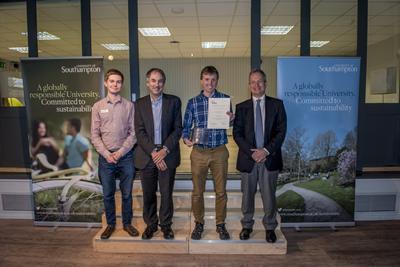
Winner of the Outstanding Staff Award: Tony Curran
Dr Tony Curran developed ‘The Burger Apocalypse’, a highly participative session exploring the environmental impacts of our food –which accounts for around 20% of the UK’s carbon footprint. Attendees learn about the A-B-C of low carbon eating: Avoiding wasting food, Buying in-season food and Choosing low carbon food. It is named The Burger Apocalypse to highlight that red meat has a particularly high carbon footprint. This initiative raises awareness, leading to behavior change, in this important area of everybody’s daily life. There are connections to Southampton research, stemming from the waste management and carbon footprinting strengths in the Centre for Environmental Sciences. To-date 1100 people have participated, including at Glastonbury, Bestival, Cheltenham Science Festival and university outreach events. Tony developed a food seasonality chart for participants to take home with them – encouraging behavior change beyond the event itself. Tony has brought copies of the seasonality chart for you all today.
Runner up of the Outstanding Staff Award: Ian Williams
Since 1996, Professor Ian Williams has initiated, developed and delivered sustainability-focused research projects that involve collaboration between university academics, students and local authorities. Over the last 20 years, local authorities have been impacted by changes in EU environmental directives that seek to improve waste and carbon management and prevent pollution. Through establishing collaborative research projects, Ian has helped dozens of local authorities to access specialist knowledge and skills and implement strategic and practical activities to meet these changes. By involving students through internships, work placements and dissertations, Ian provides them with real-world experiences to enhance their sustainability and employability skills. This co-operative research has driven increased recycling rates, greater public participation, and the development of a new international standard on urban carbon foot-printing. Multiple students have secured employment or promotion, and 55 peer-reviewed journal and conference papers have been published. Ian’s work benefits the university, local authorities and students alike.